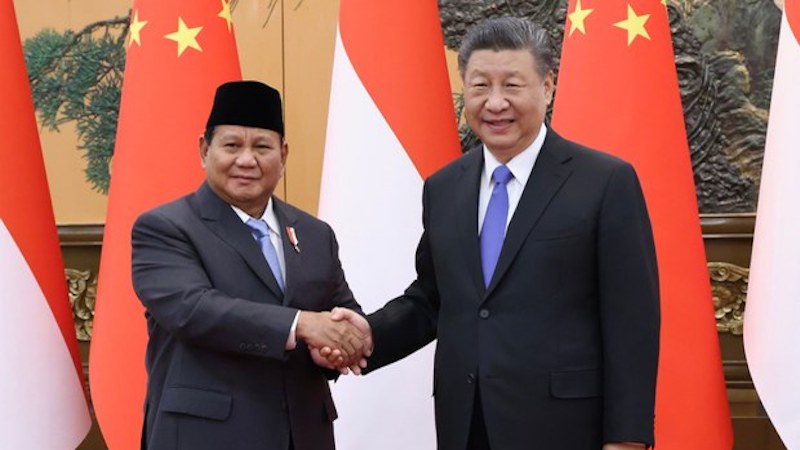Expect The Expected With Prabowo’s Incoming China Policy – Analysis

By Daniel Peterson
On 1 April 2024, Indonesia’s president-elect, Prabowo Subianto, travelled to Beijing at the invitation of ChinesePresident Xi Jinping. Having secured the presidency on 14 February 2024via indirect but dubious means, Prabowo wasted little time signalling his intent to cooperate with China.
While Indonesiaalsovalues its relationshipswith Japan and Malaysia, its relationship with China cannot be overstated. Not only does China invest heavily in Indonesian infrastructure and connectivity projects, but rising US–China bipolarity and China’s continued belligerence in the South China Sea leave Indonesia in a precarious position. With three of the world’s most important chokepoints — the Malacca, Lombok and Sumba Straits — Indonesiaisarguably the most geostrategically important territory in any broader Indo-Pacific conflict.
China’s foreign policy is typically one ofelite capture, meaning that Prabowo’s election victory immediately placed the former military general in Xi’s sights. The primary purpose of Xi’s invitation to Prabowo was to enquire whetherhewould maintain the same stance towards China as Indonesia’s incumbent president, Joko‘Jokowi’Widodo.
Jokowi, whose presidency concludes in October 2024, visited Chinaeight times in 10 years and met Xi on 12 occasions. In addition to fostering increased trade, Jokowi granted a significant number ofinfrastructure contracts to China.But the roots of such investment predate Jokowihimself.Between 2000and2017, Indonesia was China’s fourth highest recipient ofoverseas direct investment, receiving US$4.42 billion, and sixth highest recipient of other official flows, receiving US$29.96 billion.
As of 2021,Indonesia’ssovereigndebtexposureto Chinawas US$4.95 billion, but another US$17.28 billion of ‘hidden’ public debt — debt incurred by Indonesian state owned enterprises — was not on the government ledger. Hence, in 2021, 78 per cent of Indonesia’s debt to China was not supported by a sovereign guarantee.
Prabowo should thus limit Indonesia’s growing debt exposure to China. Yet hewill likelymaintain the same approach to China as Jokowi.
Indonesia has no coherent China policy.Rather, it is a personality-driven relationship. And Prabowo’s presidency will likely be an extension of Jokowi’s. Indeed, Prabowo secured the presidency by running with Jokowi’s son, Gibran Rakabuming Raka. But Gibran was only deemed eligible to run after Indonesia’s Constitutional Court, then headed by Gibran’s uncle Anwar Usman,amended the country’s2017 General Election Law, thereby making the 36-year-old Gibran eligible to run — the General Election Law had prescribed the minimum age of eligibility as 40 — on the contrived ground that he had already held political office.
Prabowo lost to Jokowi in 2014 and 2019 — andas late as October 2023 was not even the favourite to secure the presidency. That Prabowowon in a landslide was evidence that his own presidential legitimacy derived primarily from hisnewfoundclose associationwith Jokowi. Unsurprisingly, Jokowi himself has called for a ‘sync’ between his outgoing government and the plans of the incoming Prabowo–Gibran team.
Hence, itis unlikely that Prabowowillalter courseon China. ThiscontrastswithPhilippine President Ferdinand Marcos Jr, whosedecision to stand up to Chinais distinct from his predecessor Rodrigo Duterte. While Duterte’ssister Sara is Marcos’s vice president, Marcos does not enjoy ahealthy relationship with her,in part due to his fractious relationship with his predecessor.
Indonesia is also already in too deep with China. It is second only to Pakistan in terms of China-funded infrastructure projects already underway, with a project value of US$20.3 billion. Indonesia has the same number of projects as Pakistan, 71,second only to Cambodia’s 82.
In 2022, bilateral Indonesia–China trade reached US$149.1 billion,up 19.8 percentyear-on-year,andChina was the second-largest source of investment in Indonesia, investing US$8.2 billion. In July 2023,China pledgedan additional US$44.89 billion to Indonesia, and in September another US$21.7 billion.
Prabowo would be foolish to think China would never leverage that debt, likely to try to compromise Indonesia’s official non-aligned position.
At the same time, Prabowo shows no signs of limiting Chinese investment. In November 2023, for example, Prabowo defended the China-financed development of the Rempang Eco-City, an industrial park that will see indigenous communities have theirland acquired compulsorilyfor the construction of a China-owned glass and solar panel manufacturing facility.After locals demonstrated against the proposed conversion of their homes into a foreign-owned industrial park, Prabowo obfuscated,blamingthe unrestonsupposed meddling foreign operatives.
Third, Indonesia’s navy is tinycompared to China’s. Indonesia comprises 18,000 islands and 5 million square kilometres of water, yet its navy comprises a mere four submarines. Whileplansaboundto more than double that fleet, Prabowo, as current Minister of Defence, is still yet to put pen to paper for theconstruction ofsubmarines. While Prabowo has talked about Indonesia’s maritime sovereignty being non-negotiable, the truth is that Indonesia’s unstated approach is to do whatever it can to prevent conflict and maintain the regional status quo. It has achieved this, sofar, throughbackroom conversations and dialogue with China.
It remains conjecture whether China actually does intend to engage in a war to ‘reunify’ with Taiwan.Chinamay merely want to be recognised as the regional hegemon and have continued access to the South China Sea, the United Nations Convention on the Law of the Sea notwithstanding. AChinese invasion of Taiwan is,according tosomesources, highly unlikely. That said,rumoursaboundthat Xi could launch a ‘reunification’ campaign as early as 2025.
Put simply, Indonesia lacks a coherent China policy, and changes under Prabowo are highly improbable. Even ifChina didinvadeTaiwan, there is little Indonesia could do, other than calling for the cessation of conflict.
- About the author: Daniel Peterson is a Lecturer in Politics of Southeast Asia at Queen’s University of London, where he researches Political Islam, Indonesia and the Indonesia–China relationship.
- Source: This article was published by East Asia Forum
